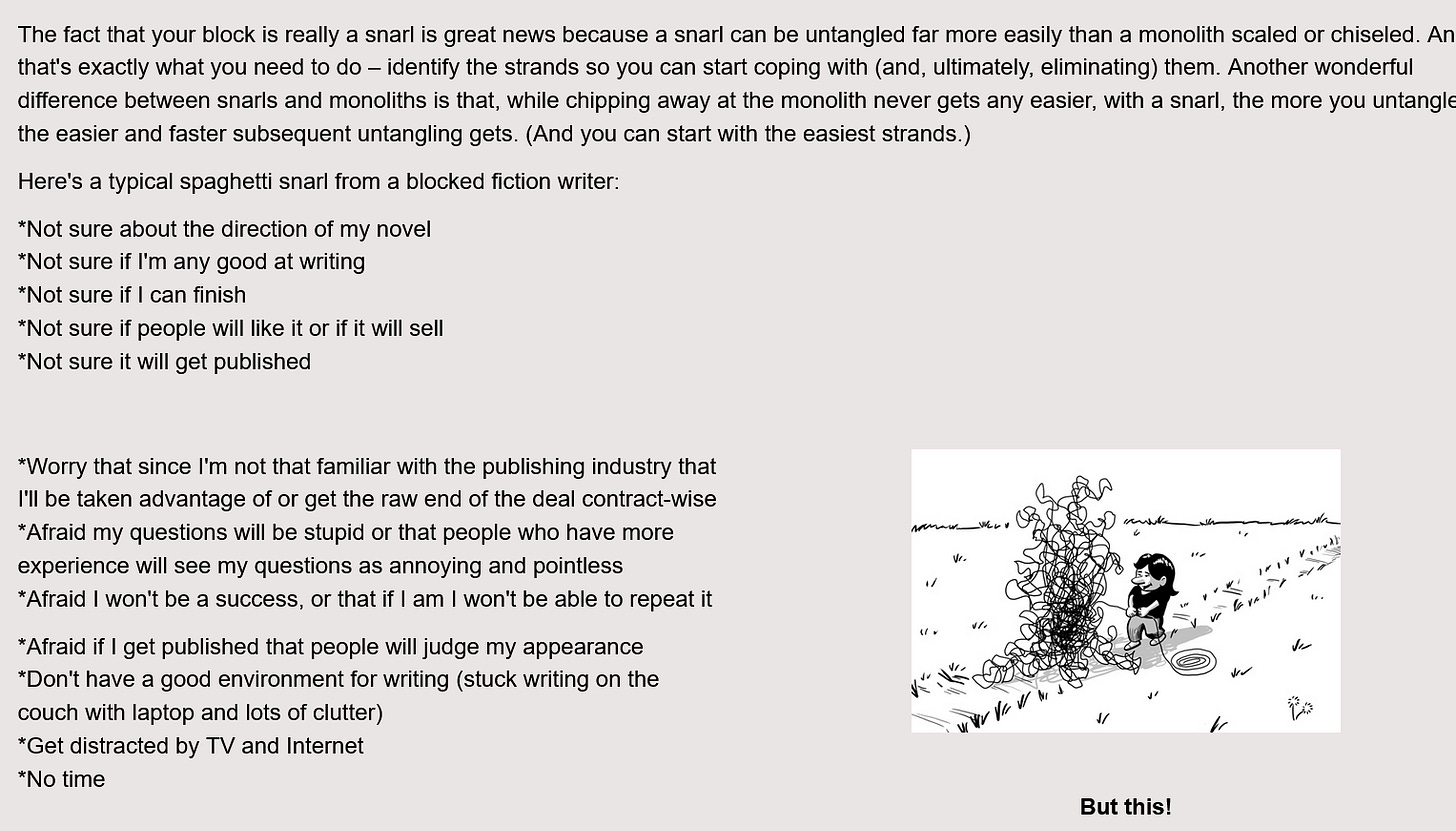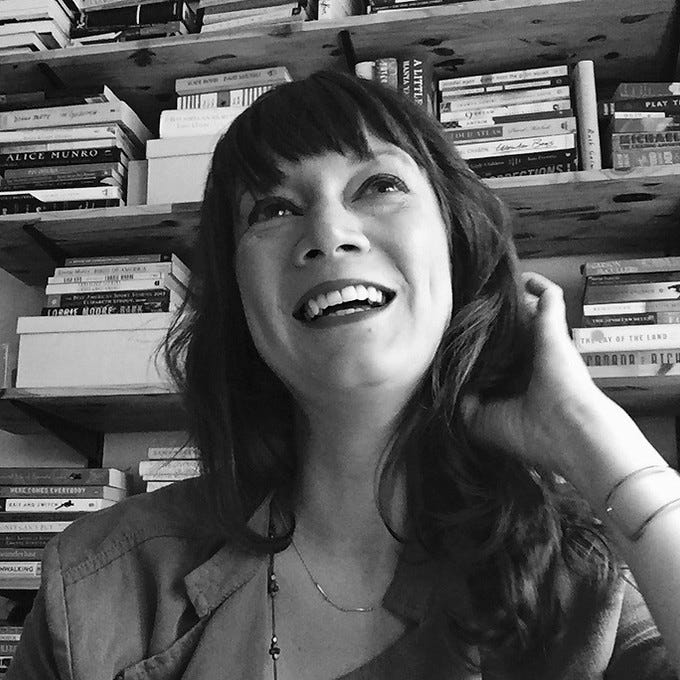counts as writing: an interview with writer & writing teacher Keri Bertino
process notebooks, the magic of showers and park benches, re-envisioning your writer's block
Welcome to Write More! This is the your mid-month pop-in (the second one for July! earlier this month we heard from novelist Erin Flanagan, whose new thriller Blackout is out now), which comes with ideas, encouragement, and writing prompts. I also send out a monthly intentions email on the last Sunday before a new month starts that aims to help you think through your goals and intentions for your writing practice in the coming month and to reflect on your progress in the previous month.
Today I’ve got a great interview with writer and writing teacher Keri Bertino, who I got to know initially because I read her amazing essay on extramural birth and immediately followed her on twitter to find everything else she was writing. I took her Writing for Fuck Ups workshop last summer and learned so much from her. She’s teaching another session of Writing for Fuck Ups this summer along with her Writing Through Motherhood course.
A bit more about Keri before we get started: Keri Bertino is a writer and teacher in Columbia University's graduate Writing Program, where she received her MFA in Fiction. Her writing has appeared/is forthcoming in Joyland, Topic, BOMB, Electric Literature, The Millions, Columbia Journal, McSweeney's Internet Tendency, and elsewhere. She lives in Brooklyn, NY, with her husband and two children. (Read more on her website! You can also find her on twitter.)
A few tips and big ideas from our conversation that I think you’ll love:
keeping a process notebook to think about what your writing is doing and where you’re getting stuck (and to maybe trick yourself into writing)
the importance of asking for help when you’re stuck
a feeling of despair about your project often happens right before a big breakthrough (phew did I need to re-read those words today)
writer’s block is a snarl, not a wall—and you can untangle it
We talked via zoom. Below you’ll find an excerpt of our conversation. (And you’ll find a couple writing exercises and experiments based on Keri’s good ideas at the very bottom of this newsletter!)
you’re not a fuck up: a conversation with Keri Bertino
Nancy
So I wanted to start initially by talking about your Writing for Fuckups course. That message really resonated last summer, like in that pandemic moment and now we're in a different pandemic moment, but I think it’s still relevant. Why do so many of us think we’re fuck ups?
Keri
I think it's a couple of different layers of myth.
I mean I think one of them is about what writing is and what writing looks like. I think that we picture you know, like, somebody sitting at a desk and typing quietly and maybe sipping coffee. But writing–the actual process and practice of writing–involves so much more than that, and I think we tend to feel like anything other than continuously typing words is not writing, or it can feel like not writing.
And I just think that we don't give ourselves enough credit for the things that are absolutely going towards writing but are not just like butt-in-seat typing. Obviously, one has to be judicious about like where is the line on that, right? I love that there is also a Twitter account account called Counts as Writing, have you seen that?
Nancy
Yeah
Keri
I love it. “Today rearranging your refrigerator counts as writing.”

I think that there is a wide spectrum of things that contribute to writing that aren't just butt in the seat and when we're not doing just butt in the seat it can feel like we’re not working. So I think that's one.
I think another part of it is a big idea about what writing is–that it’s like one individual mind in isolation, turning out genius–and I think that writing is actually more often a much more social thing. If we think that we have to do this by ourselves and that we should be doing it by ourselves and, if we're not just locking ourselves up and not talking to anyone else we're doing it wrong–and I think that's not really helpful or true. Through 20 years almost of working in writing centers and with other writers, I have found that there's just so much to be gained by talking through ideas.
Nancy
What are the things that count as writing in your life?
Keri
I'm working on an essay right now about Writing through Motherhood and I got to a point where I was looking at this sentence, and it was really bothering me and getting me stuck, and I was trying to figure out why. I realized it's because there's a you in the sentence, but I wasn't sure that I had established who I'm talking or who my audience is. So I texted my friend who is a writer and writing teacher and asked, can I text you my thinking on this? I think I sent her about 18 texts in a row being like, here is what I'm thinking about, and I started to figure out a lot about the essay in there, without her having to read all 14 pages of the draft. Then we had a quick conversation where I was also able to figure out, oh actually it's not a you, it's a we.
So I think about different ways to both identify what's actually bugging me about something and then to find a way in that's not just staring at the cursor.
I have this notebook which is my meta writing notebook. I don't draft in it, but I write about what I'm writing. And so, that’s also its own kind of skill of paying attention to when you feel stuck, like oh I just disabled the app that blocked me from Twitter again like, no, no, no, put it back. You're having a hard time right now, go to your notebook. And in that notebook I’ll try to articulate things like: what is my question right now, or what am I having a hard time or what am I trying to do with this? So I'll just write about what I'm stuck with and that helps a lot. And often, it's a way of tricking myself, so I will start out taking notes and then I actually wind up drafting.
I was working on something last week, I had to give a memorial address at my college reunion, which felt like this very weighty responsibility. I was trying to figure out how to pull off this thing I was trying to do, and I wound up just numbering the sections. Then I could just look at it and be like right now I'm just looking at section one, and it's so basic but it took it from I have to write this thing to actually I’m just working on section one. So I do a lot of breaking down into micro goals and micro tasks.
I also find that like when I'm stuck sometimes, if I just print something out or if I hand write it and then I take it outside, I don't know, it’s magic for some reason. If I've been staring and staring at something, and it’s just me with a picnic bench in the park and a print out, it’s like magic every time. I don't know why, but it helps.
Nancy
One of the things that I always have remember about my own process is when I’m feeling the most stuck, and I've been sitting and staring at my computer like, I'm so dumb, I'm never gonna figure this out, why did I think I could do it? If I go for a walk like that's usually when it cracks open. There’s just something about moving.
Keri
Walks and showers, yes. It’s magic, I don't know why. I often wind up showering in the middle of the day, as opposed to the beginning of it because I usually like saving that and breaking up the day. I'm good first thing in the morning, but you know you go for an hour or two, and I’m like, let me restart this.
Nancy
I love that you’re doing that strategically–like saving the shower for when you're stuck and you need them a break, that is not a Twitter break, right? Like, a shower counts as writing.
Keri
Also hygiene that everyone’s grateful for.
Nancy
Yeah right, exactly. It serves many purposes there for you.
One of the things that helped me the most in last summer’s Writing for Fuck Ups was that image of the writer's block and breaking down different things that can help you to feel blocked. So I wondered if you could talk about that and share any other tips that you have.
Keri
Yeah, that came from Hillary Rettig, in her book The 7 Secrets of the Prolific: The Definitive Guide to Overcoming Procrastination, Perfectionism and Writer's Block.

It's a whole book on basically procrastination for writers specifically and kind of breaking that down. So it’s not that you're lazy, it's actually that there's all this other stuff going on and some of it is often you know confronting your own feelings. She has this image–an actual line drawing of snarls. She says, instead of thinking about a writer's block as this thing that's getting in front of you, think about it as a snarl with all of these individual lines that you can tease out one at a time and address one at a time. So it becomes less of an intimidating monolith.

I was working on a novel revision this spring and just got to a point where I just had lost faith in the project. I’ve found that very often those moments come right before we're about to level up on something. It makes it sort of a dark point, where I really don't know if I can answer why I'm doing something.
And this is why it's so important, I think, to have a community of writers, because you need people in your life, who you can make this ask of and they will not think you're crazy. I texted my friend and was like, I am teary in the library right now, I am feeling so stuck and dispirited. And I asked, can I meet with you tomorrow and just talk out what I'm trying to do? And I said, I need you to do two jobs while you're listening, like number one midwife and cheerlead for me, but the other part is also have your bs detector on because what I am afraid of right now is that I'm trying to pull a fast one on myself or my reader. If there's something here that's not true or not actually logically connected, I need to either know that that's not the case or where it is so I can address it. And so we sat down the next day with coffee and she and I just talked and she took notes, for me, for an hour and by the end of it, I figured out all of this stuff that I just sort of needed to talk through out loud. I have been happily working ever since, but without that friend, you I could have just stayed in that point of despair or project abandonment for months. Instead I got it over with in basically two days. It just saves time and it makes the hard parts shorter and less hard.
So, in that spirit of making the hard parts shorter and less hard, a few writing exercises and experiments:
Start a process notebook. I’d grab something small and junky, something you can stash in a purse or in your back pocket. When you’re feeling stuck in your writing, instead of doomscrolling or checking your email, open your process notebook and try to think about what’s happening in your writing. Where are you stuck? I’ll often start by writing something like “what I’m trying to say here is . . . ” or “what this section needs to do is . . .”
When you’re approaching despair, ask for help. If you have a writer friend, that’s great—but you could also just ask someone else in your life who’s a good listener to help you think. What I loved about Keri’s example of talking to her friend about her novel is how specifically she asked for what she needed.
If you’re feeling stuck, write out your snarl. Hillary Rettig’s book and website are a great resource for this, and I’d encourage you to click on over and check those out. I’ll add that last summer, Keri had us make a bunch of lists related to a snarl we were experiencing: which problems were related to knowledge? what problems were about material stuff, like time or space? what problems were related to feelings or mental health? Breaking your snarl down into strands can help you come up with solutions and also recognize which things you can’t really fix at the moment.
I’ll be back on Sunday the 31st with your August goals and intentions email. I’d love to hear from you between now and then. You can always reply to this email, comment below, or find me on twitter (@nancy_reddy) and instagram (@nancy.o.reddy). If you’ve enjoyed this newsletter, I’d love it if you would share it online or send it to a friend.




